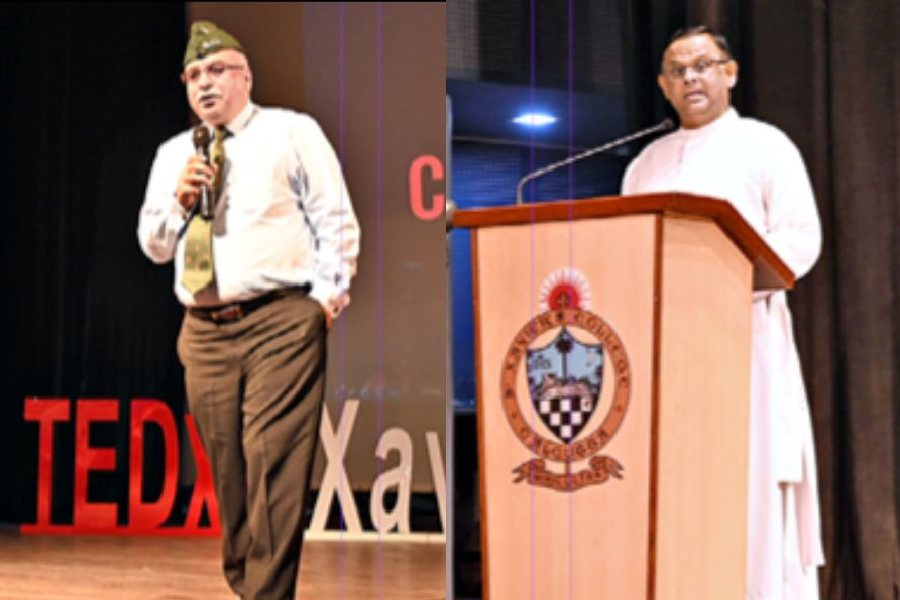Language of love to win over insurgents


An army officer chose to learn a tribal dialect to befriend the local populace instead of wielding the baton to control them.
A scientist said space missions needed teamwork and people from diverse backgrounds.
Five speakers from different spheres of life shared their experiences in front of students at the TEDxStXaviersCollegeKolkata, held in association with The Telegraph, on October 11.
One of them was Colonel Prakash Tewari (retired), a motivational speaker who served in the Indian Army for 26 years.
He shared a story from his posting in Nagaland, as “a young captain” in 1984. The state was in the middle of an armed insurgency and a “deep divide” ensued between the residents and the army, mainly because of the contentious Armed Forces Special Powers Act (AFSPA).
Tewari, posted in a village called Chenmoho in Mon district, wanted the insurgents to give up arms and return to the mainstream. But instead of forcing them to surrender, he wanted to win their hearts.
His commanding officer was not particularly impressed, but reluctantly gave him three months to experiment.
“I was convinced that the way to solve the problem was not through military operations. It was a psychological problem as the people did not connect with us and felt alienated,” Colonel Tewari said.
He started learning the local Konyak language from the son of a village headman.
“I began the classes in the right earnest, practising 10 to 12 hours a day and was soon able to pick up the language.”
After a month, it was announced that as post commander, Tewari would address all the villagers at the Sunday service at the local church.
“The pastor called the dobhashi (translator) to assist me. I came to the podium, thanked the translator and requested him to be seated. I spoke in Konyaki. The speech went on for 40 minutes. When it ended, the crowd burst into a loud applause as I was able to reach out to the old, young, boys, girls, students, everyone,” he told the audience at St Xavier’s College.
By that gesture, the young officer was able to win the confidence of the residents and his tenure saw a spate of surrenders by insurgents.
“Small actions make big ripples,” Colonel Tewari said. His speech at the Park Street college was also met with a loud applause.
Ramamurthy Rallabandi, a full-time researcher at Anna University and a former scientist at BrahMos Aerospace, Defence Research and Development Organisation, was another speaker.
A former consultant to Isro on Chandrayaan-1, India’s first lunar mission, Rallabandi told students that a space mission needs coordination between people from different backgrounds.
“A lot of students ask me what it takes to work with aerospace and defence and space institutes or organisations. Many kids think if they study mechanical engineering or electronics and communications, or even a bachelor’s in physics, mathematics, chemistry, you may not get the opportunity to work in places like Isro. It is not true. Please just concentrate on your studies and what you’re passionate about… you’ll be in demand soon,” he said.
“A rocket or a missile is a system which would have an on-board computer and of course will have to be powered by a propulsion system and needs to be integrated with all those sensors... for guidance, navigation and control. So electrical, electronics, instrumentation, mechanical, aerospace, computer science and all basic sciences, all are required to put these in place,” he said.
Bhakti Vinoda Swami, an NIT Trichy alumnus-turned monk and a trustee of the International Society for Krishna Consciousness (Iskcon); Jalpesh Mehta, a Mumbai-based banker and environmentalist; and Pritika Loonia, a digital content creator and influencer and a brand strategist, were the other speakers at the event.
Father Dominic Savio, principal of St Xavier’s College, Calcutta, said in his inaugural address: “We are ecstatic to be associated with an organisation that believes in propagating ideas, promoting narratives and highlighting individuals who have, knowingly or unknowingly, left an imprint on the lives of people, and the society at large.”